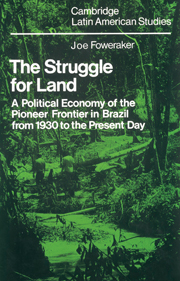 The Struggle for Land
The Struggle for Land Published online by Cambridge University Press: 29 October 2009
Frontier expansion was interpreted in the last chapter as a process of integration into the national economy. This integration was seen to proceed through interrelated changes in both production and market relations: the integration which occurs through the progressive change to commercial production in response to the national market is simultaneously a transition from non-capitalist to capitalist production. This interpretation illuminates the process itself, but does not yet pose the question of the relationship between frontier and national economy; in effect, it suggests what occurs in frontier expansion but not why it occurs. Nevertheless, in proceeding to answer this latter question, it is apparent that the prior investigation of the process has revealed the principal dimensions of the determining structure – at least in the economic realm. Thus the question of the relationship between frontier and national economy is made two-fold: on the one hand, what are the production and property relations which determine frontier expansion and accumulation; on the other, what are the market relations which determine the transfer of value from frontier to national economy? In no sense are either or both sets of relations, which in the reality are not easily separated, to be taken as uniquely ‘determining’: their separate investigation here is simply intended as one step in the presentation of the political economy of the frontier.
This step aims to establish the structural conditions of frontier expansion, and so rejects any idea of ‘natural or ideal determination’ of the process.
To save this book to your Kindle, first ensure no-reply@cambridge.org is added to your Approved Personal Document E-mail List under your Personal Document Settings on the Manage Your Content and Devices page of your Amazon account. Then enter the ‘name’ part of your Kindle email address below. Find out more about saving to your Kindle.
Note you can select to save to either the @free.kindle.com or @kindle.com variations. ‘@free.kindle.com’ emails are free but can only be saved to your device when it is connected to wi-fi. ‘@kindle.com’ emails can be delivered even when you are not connected to wi-fi, but note that service fees apply.
Find out more about the Kindle Personal Document Service.
To save content items to your account, please confirm that you agree to abide by our usage policies. If this is the first time you use this feature, you will be asked to authorise Cambridge Core to connect with your account. Find out more about saving content to Dropbox.
To save content items to your account, please confirm that you agree to abide by our usage policies. If this is the first time you use this feature, you will be asked to authorise Cambridge Core to connect with your account. Find out more about saving content to Google Drive.